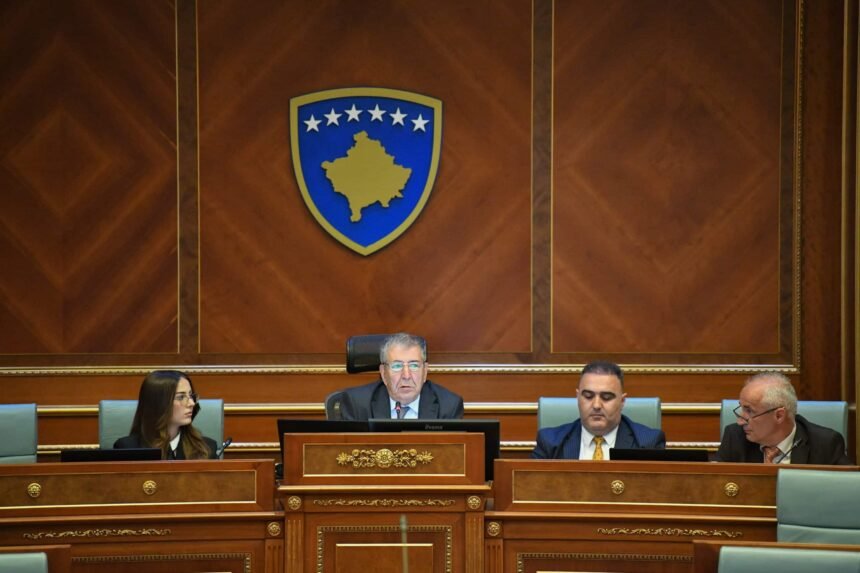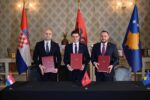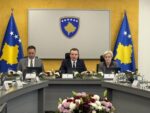Kosovo’s Assembly has entered an unprecedented political deadlock following the failure of the constitutive session of its ninth legislature, which aimed to verify the mandates of Members of Parliament elected in the February 9 elections. The session, held on Tuesday, quickly turned into a politically charged event and was adjourned without the approval of the report from the Temporary Commission for Mandate Verification, due to a lack of quorum and insufficient support from MPs, as reported by Rks News.
The session was opened in line with parliamentary procedure by the oldest MP, Avni Dehari of Vetëvendosje (LVV), assisted by the youngest MP, Sala Jashari from the Democratic Party of Kosovo (PDK). However, when the time came to vote on the Commission’s report, tensions rose. Only 52 MPs voted in favor, while 46 were against and 11 abstained, preventing the report from being adopted.
Support for the report came from LVV and the Social Democratic Initiative (Nisma), while opposition parties—including PDK, the Democratic League of Kosovo (LDK), and the Alliance for the Future of Kosovo (AAK)—voted against it. The Serb List abstained. Following this result, the presiding member, Avni Dehari, declared that the session could not continue without the report’s approval and announced he would seek guidance from President Vjosa Osmani on how to proceed.
At the heart of the controversy lies the timing and validity of resignation letters submitted by acting Prime Minister Albin Kurti and several ministers who were elected as MPs. Opposition parties questioned whether these resignations were formally submitted and legally binding. LDK’s Armend Zemaj raised concerns about delays in documentation and the lack of clarity, stating fears that Kurti might attempt to continue functioning as Prime Minister even after being sworn in as an MP, which would be a breach of the Constitution.
Ramush Haradinaj, leader of AAK, supported this concern, saying, “You cannot sit in two chairs at the same time,” and emphasized the need for Kurti and his cabinet to choose between their executive or legislative roles. PDK accused LVV of causing the institutional impasse, pointing to the lack of clear, formal resignations as the main reason for rejecting the Commission’s report. PDK leader Memli Krasniqi insisted that all resignations must be complete, properly documented, and follow official procedures.
LDK leader Lumir Abdixhiku made it clear that his party is not opposed to the report in principle but would continue to vote against it until the resignations meet formal legal standards. He also nominated Kujtim Shala as Vice President of the Assembly and Hykmete Bajrami as the head of LDK’s parliamentary group.
Meanwhile, AAK reiterated its stance that Kurti is deliberately obstructing the process and not respecting the Constitution. Artan Abrashi, head of the Temporary Commission for Verification, insisted that the resignations had in fact been submitted and accused the opposition of fabricating an unnecessary political crisis. Faton Peci, an MP from the GUXO movement, went further, calling the opposition’s actions a coordinated effort between the Albanian opposition and the Serb List to block the process.
In response, acting Prime Minister Albin Kurti posted a statement on Facebook, calling the opposition’s rejection of the mandate verification a “direct attack on democratic order and the legitimacy of the February 9 elections,” accusing them of institutional sabotage and obstructing the democratic process.
The Office of the President later confirmed that no official correspondence had been received from the Assembly regarding next steps. According to the Assembly’s rules of procedure, the interruption of the constitutive session cannot exceed 48 hours, meaning a new session must be called no later than Thursday.
Enver Hasani, former President of Kosovo’s Constitutional Court, stated that the Assembly is not legally blocked and can reconvene. However, he criticized the opposition for what he described as a lack of political vision and for voting against the Commission’s report without a constructive alternative.
Although Tuesday’s session failed to verify the mandates of the newly elected MPs, the legal framework obliges the Assembly to reconvene within 48 hours. If a resolution is not reached by Thursday, Kosovo risks sliding deeper into political crisis with potentially serious consequences for the functioning of its democratic institutions.







